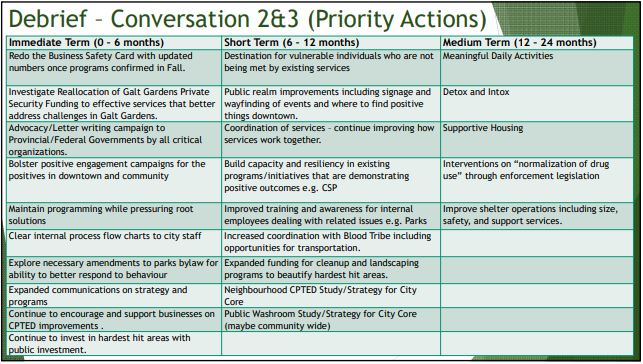The Lethbridge Downtown Clean and Safe Strategy (DCSS) is asking the city for more funding as the number of initiatives increase and produce positive results.

The Community Issues Committee heard a presentation from Urban Revitalization manager, Andrew Malcolm, on Monday evening.
In that presentation, Malcolm addressed several issues mentioned in a poll as being seen in the downtown Lethbridge area, including public drug use, thefts and racial insensitivity.
The DCSS polled more than a dozen community groups, several city departments, as well as external parties that included the Lethbridge police, Heart of Our City Committee, Canadian Mental Health Association, the Diversion Outreach Team, the Clean Sweep Program, the Downtown BRZ and the Lethbridge Chamber of Commerce.
The poll results show that public drug use and needle debris have been reduced.
Surfacing more recently are higher statistics of violence toward services designed to help and instances of racial insensitivity.

Malcolm says the DCSS has seen positive results in the initiatives already started, including partnerships with the Lethbridge Police Service to create the Watch, and the Clean Sweep Program.
“The Downtown Clean and Safe Strategy was first launched in the beginning of 2019, on the heels of the BRZ and the chamber and a number of businesses in the downtown and surrounding area coming forward with concerns with cleanliness and safety,” Malcolm said.
“So we quickly mobilized and put together a strategy. When we first brought it forward in 2019 there were 12 initiatives. Throughout the year of implementation we grew that to 18 initiatives.

Get breaking National news
“Now with the 2020-2022 program, we’ve increased that to 20 initiatives. But that comes with a new budget ask.”

The Galt Gardens Outreach Program seeks to replace the contracted security in the gardens with effective outreach for those struggling with addictions and homelessness.
“We’ve been providing private security in Galt Gardens for over a decade now and that comes with a fairly significant price tag, but it’s important for businesses and the community to feel safe there,” Malcolm said.
“The issue is quite localized in the park, and it’s dealing with a specific demographic.
“We just want to be more open and receptive to the individual needs of those people, and private security we don’t feel is making the right inroads. So we’re going to take a step back and take more of an outreach perspective and hopefully put together a program to address that.”

DCSS priorities listed in the presentation to the Community Issues Committee Monday evening.
Another suggestion moving forward is the City Core Safety Evaluation which would reevaluate the city’s infrastructure.
“That is really about taking a step back and looking at our urban core in terms of the built environment and where we can make improvements through regular infrastructure spending,” Malcolm said, adding that this may include increasing the number of streetlights to eliminate dark pockets and evaluating infrastructure to improve sight lines.
The presentation will be presented to Lethbridge city council on Monday.
Malcolm says he is confident the city will agree with the suggestions and support the DCSS moving forward.







Comments
Comments closed.
Due to the sensitive and/or legal subject matter of some of the content on globalnews.ca, we reserve the ability to disable comments from time to time.
Please see our Commenting Policy for more.